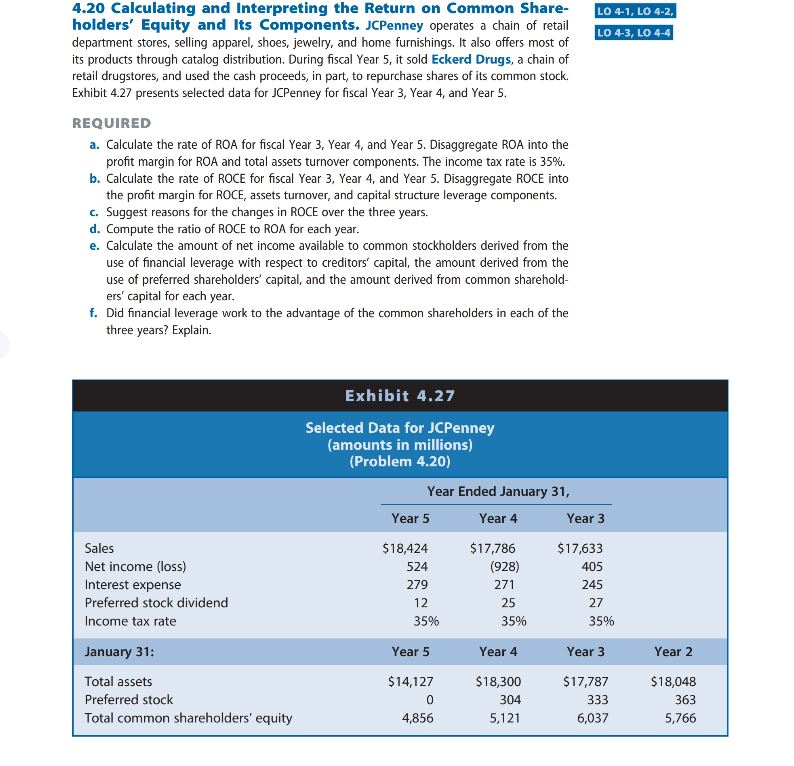Please provide the solution to Part E of Problem 4.20 which is included in the attached file. The question is also listed below:

4.20 Calculating and Interpreting the Return on Common Share- Lo 41, LO 4-2. holders' Equity and Its Components. JCPenney operates a chain of retail department stores, selling apparel, shoes, jewelry, and home furnishings. It also offers most of its products through catalog distribution. During fiscal Year 5, it sold Eckerd Drugs, a chain of retail drugstores, and used the cash proceeds, in part, to repurchase shares of its common stock. Exhibit 4.27 presents selected data for JCPenney for fiscal Year 3, Year 4, and Year 5 LO 4-3, LO 4-4 REQUIRED a. Calclate the rate of ROA for fiscal Year 3, Year 4, and Year 5. Disaggregate ROA into the profit margin for ROA and total assets turnover components. The income tax rate is 35%. b. Calculate the rate of ROCE for fiscal Year 3, Year 4, and Year 5. Disaggregate ROCE into the profit margin for ROCE, assets turnover, and capital structure leverage components. c. Suggest reasons for the changes in ROCE over the three years. d. Compute the ratio of ROCE to ROA for each year. e. Calculate the amount of net income available to common stockholders derived from the use of financia everage with respect to creditors' capital, the amount derived from the use of preferred shareholders' capital, and the amount derived from common sharehold ers' capital for each year f. Did financial leverage work to the advantage of the common shareholders in each of the three years? Explain. Exhibit 4.27 Selected Data for JCPenney amounts in millions) Problem 4.20) Year Ended January 31, Year 5 Year 4 ear $18,424 524 $17,786 Sales Net income (loss) Interest expense Preferred stock dividend Income tax rate (928) 271 25 $17,633 405 245 27 12 3596 35% 35% January 31 Total assets Preferred stock Total common shareholders' equity Year 5 $14,127 4,856 Year 3 17,787 6,037 Year 4 Year 2 $18,300 304 5,121 $18,048 363 5,766 4.20 Calculating and Interpreting the Return on Common Share- Lo 41, LO 4-2. holders' Equity and Its Components. JCPenney operates a chain of retail department stores, selling apparel, shoes, jewelry, and home furnishings. It also offers most of its products through catalog distribution. During fiscal Year 5, it sold Eckerd Drugs, a chain of retail drugstores, and used the cash proceeds, in part, to repurchase shares of its common stock. Exhibit 4.27 presents selected data for JCPenney for fiscal Year 3, Year 4, and Year 5 LO 4-3, LO 4-4 REQUIRED a. Calclate the rate of ROA for fiscal Year 3, Year 4, and Year 5. Disaggregate ROA into the profit margin for ROA and total assets turnover components. The income tax rate is 35%. b. Calculate the rate of ROCE for fiscal Year 3, Year 4, and Year 5. Disaggregate ROCE into the profit margin for ROCE, assets turnover, and capital structure leverage components. c. Suggest reasons for the changes in ROCE over the three years. d. Compute the ratio of ROCE to ROA for each year. e. Calculate the amount of net income available to common stockholders derived from the use of financia everage with respect to creditors' capital, the amount derived from the use of preferred shareholders' capital, and the amount derived from common sharehold ers' capital for each year f. Did financial leverage work to the advantage of the common shareholders in each of the three years? Explain. Exhibit 4.27 Selected Data for JCPenney amounts in millions) Problem 4.20) Year Ended January 31, Year 5 Year 4 ear $18,424 524 $17,786 Sales Net income (loss) Interest expense Preferred stock dividend Income tax rate (928) 271 25 $17,633 405 245 27 12 3596 35% 35% January 31 Total assets Preferred stock Total common shareholders' equity Year 5 $14,127 4,856 Year 3 17,787 6,037 Year 4 Year 2 $18,300 304 5,121 $18,048 363 5,766







